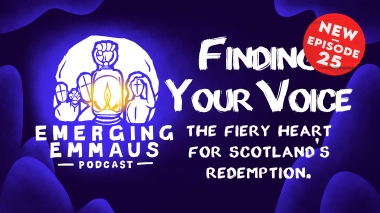The cliffhanger…

Listen to this daily worship
Jonah 4: 4 -11 (NRSVA)
4 And the Lord said, ‘Is it right for you to be angry?’ 5 Then Jonah went out of the city and sat down east of the city, and made a booth for himself there. He sat under it in the shade, waiting to see what would become of the city.
6 The Lord God appointed a bush, and made it come up over Jonah, to give shade over his head, to save him from his discomfort; so Jonah was very happy about the bush. 7 But when dawn came up the next day, God appointed a worm that attacked the bush, so that it withered. 8 When the sun rose, God prepared a sultry east wind, and the sun beat down on the head of Jonah so that he was faint and asked that he might die. He said, ‘It is better for me to die than to live.’
9 But God said to Jonah, ‘Is it right for you to be angry about the bush?’ And he said, ‘Yes, angry enough to die.’ 10 Then the Lord said, ‘You are concerned about the bush, for which you did not labour and which you did not grow; it came into being in a night and perished in a night. 11 And should I not be concerned about Nineveh, that great city, in which there are more than a hundred and twenty thousand people who do not know their right hand from their left, and also many animals?’
The story of Jonah ends with a question. God likes questions. For example, when Job challenges God, rather than simply putting Job in his place, God asked him questions: “Where were you when I laid the foundations of the earth, tell me if you understand?” (Job 38:4) The questions have the same effect of course, that of putting Job in his place, but in a way which allows Job to come to the conclusion by himself. It’s a technique which Socrates would have recognised. God’s questions are significant, probing, and have a focus. He knows the conclusion he wishes Job, and then Jonah, to reach, and his questions to both are leading in that direction. Sadly, we do not see the outcome of this particular conversation. Yet sometimes that is the most powerful ending, leaving the result to our imagination. How would we answer God’s question?
There is a challenge to us in this. The challenge is to concern ourselves with things which are our business and leave the rest to God. Perhaps the challenge is also to work out just exactly what our business is. The story of Jonah tells us that it is our business to obey God when he speaks. It tells us that God cares for everyone equally. It tells us that, although God responds to our challenges to him when we are feeling angry, or aggrieved, ultimately it is his will which will shape the future. It tells us that God works his purposes out, in ways which may seem obscure to us, but we don’t have the full picture. In the words of the serenity prayer…
“God, grant us the serenity
to accept the things we cannot change,
the courage to change the things we can,
and the wisdom to know the difference…”
Help us to recognise the task you have called us to.
May we focus on that
with all our heart, and mind, and strength,
and leave the rest to you. Amen




 Add to Favourites
Add to Favourites








Login to comment.